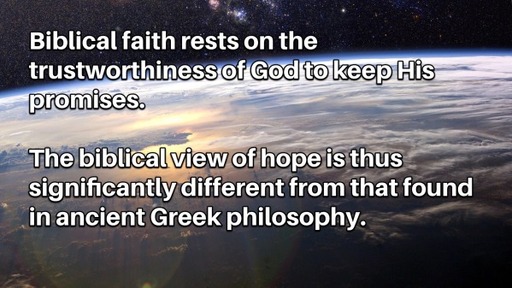HOPE

Human Hope
1.a feeling of expectation and desire for a certain thing to happen:
2.a feeling of trust:
1.want for something to happen or to be the case:
Biblical faith rests on the trustworthiness of God to keep His promises. The biblical view of hope is thus significantly different from that found in ancient Greek philosophy. The Greeks recognized that human beings expressed hope by nature; however, this kind of hope reflects both good and bad experiences. The future was thus a projection of one’s own subjective possibilities (Bultmann, “ἐλπίς, elpis,” 2.517). Biblical hope avoids this subjectivity by being founded on something that provides a sufficient basis for confidence in its fulfillment: God and His redemptive acts as they culminate in the birth, life, death, and resurrection of Jesus Christ
Where there is a belief in the living God, who acts and intervenes in human life and who can be trusted to implement his promises, hope in the specifically biblical sense becomes possible. Such hope is not a matter of temperament, nor is it conditioned by prevailing circumstances or any human possibilities. It does not depend upon what a man possesses, upon what he may be able to do for himself, nor upon what any other human being may do for him. There was, for example, nothing in the situation in which Abraham found himself to justify his hope that Sarah would give birth to a son, but because he believed in God, he could ‘in hope’ believe ‘against hope’ (Rom. 4:18). Biblical hope is inseparable therefore from faith in God. Because of what God has done in the past, particularly in preparing for the coming of Christ, and because of what God has done and is now doing through Christ, the Christian dares to expect future blessings at present invisible (2 Cor. 1:10
